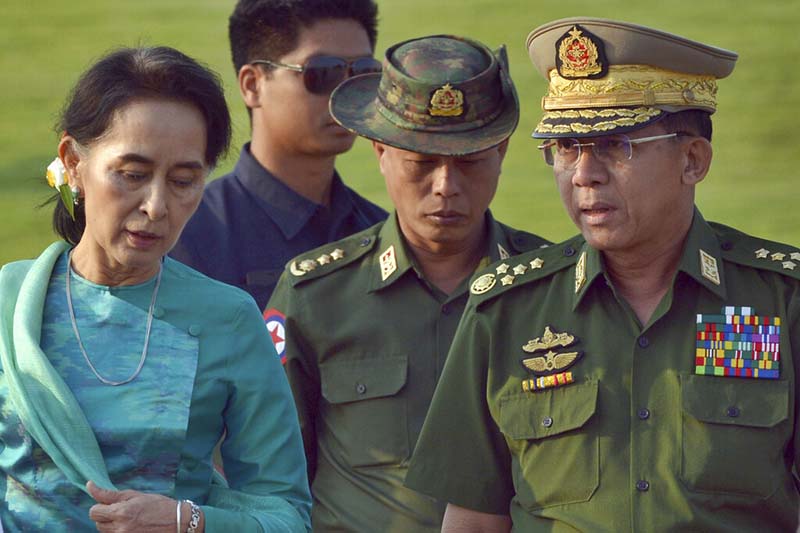

The UN Security Council is going to hold a discussion about the situation in Myanmar today, where the military staged a coup after detaining top political figures, including de facto leader Aung San Suu Kyi, and look at a “range of measures” with an idea of respecting the people’s will expressed in the November general election.
Myanmar’s military on Monday staged a coup and detained Suu Kyi and other top members of her governing party. The announcement on military-controlled Myawaddy TV came after an earlier declaration that because national stability was in jeopardy, all government functions would be transferred to military chief Senior Gen. Min Aung Hlaing.
It was also announced that the military had taken control of the country for one year.
The United Kingdom, President of the Security Council for the month of February, will hold a closed-door discussion on Myanmar when the Council is also expected to hear from Secretary-General’s Special Envoy on Myanmar Christine Schraner Burgener.
“We want to address the long term threat to peace and security of course working closely with Myanmar’s Asian and ASEAN neighbours, Barbara Woodward, Permanent Representative of the United Kingdom to the United Nations and President of the Security Council for the month, told reporters during a virtual press briefing.
She said the topic of Myanmar was originally scheduled to be discussed in the Council later this week but was moved up to Tuesday given the developments in the country over the weekend, underscoring the urgent need to discuss the situation following the coup.
The Council last discussed Myanmar in September 2020, before the November elections.
When asked if the Security Council will discuss the issue of sanctions, Woodward said the power organ of the UN will want to have as constructive a discussion as possible on Myanmar and look at a range of measures with the idea of respecting the people’s will expressed in the vote and releasing civil society leaders.
“Those will be our overriding aims and we will want to consider measures that will move us towards that end, she said.
The Council meeting is expected to be a closed-door discussion in order to allow for a “frank discussion”, she said.
“At the moment, we don’t have specific ideas on the measures. We are, first of all, trying to establish what is happening and then discuss in our national capacity so as to bring together a sense of what the UN Security Council can most effectively do in terms of the measures it might take as opposed to what individual countries might do bilaterally. The aim remains to see a restoration of democracy and the release of prisoners in the first instance and an end to the coup and the military rule, she said.
The UK remains deeply concerned by the humanitarian plight of the Rohingya refugees in Cox’s Bazar as well as in Bhasan Char, the island where Bangladesh has been moving some of the refugees to, Woodward said.
Stephane Dujarric, the Spokesman for UN Secretary-General Antonio Guterres, said at the daily press briefing the events that have taken place in Myanmar will have a ripple effect.
“One of those impacts is not only delaying any safe and voluntary return of those refugees that have made it into Bangladesh and other countries and in other countries, but we also do not know what will happen to the Rohingya that remains in Rakhine State,” he said.
He said Burgener remains actively engaged on the issue in Myanmar and she has spoken to Myanmar interlocutors outside the country.
She is trying to connect with leaders in Naypyitaw but communications with the Myanmar capital are very difficult at this moment, Dujarric said, adding that colleagues in the UN country team on the ground in Myanmar are also following the situation closely with deep concern, especially in light of the need to prevent and respond to the ongoing pandemic.
“They are working to ensure that recent events do not adversely impact the most vulnerable people in Myanmar. The UN team has supported Myanmar’s COVAX application, as well as the national COVID-19 and vaccination plans by assessing the country’s readiness and mapping the cold chain capacity,” he said.
When asked whether the UN had any information on Suu Kyi and other leaders who have been detained, Dujarric said: “No, we do not we have not been able to get information.”
“Our Special Envoy has been trying to reach her interlocutors in Naypyitaw. She’s not been able to get through, and our country team has not had any information, he said.
The UN official stressed that it was important that all those people who have been detained be released, adding that no one in the UN has been able to reach the current authorities in Myanmar due to the communications challenges.
On whether the Secretary-General would seek to talk to the military leaders in control of Myanmar, Dujarric said the UN chief is always ready to talk to anyone to try to advance the situation in the right way, be that the people directly involved or regional powers.
“I think what we’re facing right now is a situation that’s still a bit obscure. What we do know is that the will of the people of Myanmar has been overturned in an undemocratic way, and that needs to change. The will of the people needs to be respected, Dujarric said.
He emphasised that it was important for the international community to speak with one voice and what will come out of the Security Council, if something does come out, will just add more weight to that call.